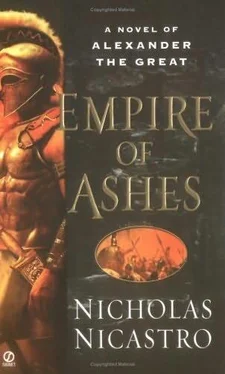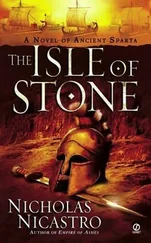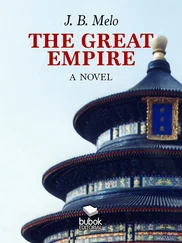Nicholas Nicastro - Empire of Ashes - A Novel of Alexander the Great
Здесь есть возможность читать онлайн «Nicholas Nicastro - Empire of Ashes - A Novel of Alexander the Great» весь текст электронной книги совершенно бесплатно (целиком полную версию без сокращений). В некоторых случаях можно слушать аудио, скачать через торрент в формате fb2 и присутствует краткое содержание. Жанр: Исторические приключения, на английском языке. Описание произведения, (предисловие) а так же отзывы посетителей доступны на портале библиотеки ЛибКат.
- Название:Empire of Ashes: A Novel of Alexander the Great
- Автор:
- Жанр:
- Год:неизвестен
- ISBN:нет данных
- Рейтинг книги:4 / 5. Голосов: 1
-
Избранное:Добавить в избранное
- Отзывы:
-
Ваша оценка:
- 80
- 1
- 2
- 3
- 4
- 5
Empire of Ashes: A Novel of Alexander the Great: краткое содержание, описание и аннотация
Предлагаем к чтению аннотацию, описание, краткое содержание или предисловие (зависит от того, что написал сам автор книги «Empire of Ashes: A Novel of Alexander the Great»). Если вы не нашли необходимую информацию о книге — напишите в комментариях, мы постараемся отыскать её.
Empire of Ashes: A Novel of Alexander the Great — читать онлайн бесплатно полную книгу (весь текст) целиком
Ниже представлен текст книги, разбитый по страницам. Система сохранения места последней прочитанной страницы, позволяет с удобством читать онлайн бесплатно книгу «Empire of Ashes: A Novel of Alexander the Great», без необходимости каждый раз заново искать на чём Вы остановились. Поставьте закладку, и сможете в любой момент перейти на страницу, на которой закончили чтение.
Интервал:
Закладка:
My opponent has already expounded on the consequences of Gaugamela, and I will not dwell of those now. What is most relevant here is that Alexander was stunned at this victory. He fought as a man liberated from any thought of tomorrow, and when Darius was carried away, he was suddenly confronted by a universe of decisions. The empire of the Great King was finished. What would replace it was then largely in Alexander’s hands. Yet how could a man with no purchase on the shape of his own future contemplate the dispensation of a continent?
When in doubt, Alexander made gifts. Along with the usual tithes to the major sanctuaries, he decided it was his obligation to honor anyone when had done anything brave in the last 150 years. Descendants of the fallen at Marathon got sacks of Persian cash; he sent pledges to rebuild the city of Plataea for its service against Xerxes. He honored even obscure figures, such as Phayllus of Croton, who had defied his countrymen to send a trireme to fight at Salamis. I don’t know how this was perceived here, but it all seemed presumptuous to me. In this way Alexander sought to attach his name not only to his own victories, but to any victory-as if he had invented valor!
The departure of Darius’s court had again left a swath of fancy detritus in its wake. Unique among these was Bagoas, the court eunuch Aeschines has spent so much of his precious breath railing against. That Bagoas sacrificed his balls is about the only true thing my opponent has said about him. Even on that score, I wonder how Aeschines comes by the extraordinary fact that Bagoas kept his dried testicles in a locket, or that they were the size of chick peas! Why not the size of olives, Aeschines? Or lentils? For my part, I have no idea to which kind of garnish Bagoas’s balls might best be compared. Unlike Aeschines, I will not testify about matters I know nothing about.
I see you all laugh…and that the archon suspects I turn these proceedings into a burlesque! But let him see that I am not laughing, and indeed no one should, for this Bagoas was a troubling presence in Alexander’s court. For it is true that he replaced Hephaestion in the King’s bed, and at a time when Alexander’s connection to his old life in Macedon was growing tenuous. The source of his charm was difficult to describe. He was beautiful, yes, but with the sleek-eyed slyness of a predator. He could no more be mistaken for a woman than a gelding could be taken for a mare. Yet to a man of Alexander’s taste and experience, he may well have presented the best of womanhood without the disadvantages. I will not put too fine a point on it; we all know that soft thighs are never just soft thighs, but that there are a hundred differences in touch, smell, and consequence when we partake of the most womanish male or mannish female. Alexander, as I have said, took the lower position with Hephaestion. With Bagoas, he claimed his place in the mount, and with that perhaps began to imagine wider possibilities for himself-even atop women, if the need arose.
The eunuch was an accomplished dancer and juggler. He also became practiced at manipulating Alexander. Whenever he wanted something, he would merely say, ‘Darius did it for me,’ and Alexander would do it too. He had merely to tell him that Darius had done some foolish thing, and Alexander would emulate it. With eyes wide open, he became a kind of slave to the eunuch. Having taken an oath to aid the King, I therefore made it my business to keep a close watch on this Bagoas, and if necessary to act against his influence. So you see that Aeschines has gotten the truth reversed: I was not conspiring with Bagoas, but against him!
You may wonder what Hephaestion thought of Alexander’s new companion. The answer must have been ‘not much,’ though I believe that like most aspects of his relationship with Alexander this issue was complicated. The King had the prerogative to take whatever lovers he pleased; beyond that, Hephaestion’s devotion to Alexander was so unqualified as to make sexual jealousy nearly beside the point. Still, there must have been some expectation, if only unspoken, that the King’s preference for another meant Hephaestion had to be compensated with more independent responsibility. This is exactly what he got.
It was about this time that news from home reached us of Antipater’s victory over the Spartan rebels at Megalopolis. The word came through it was a hard-won fight, with the combatants finally having at each other with bare hands. King Agis, we learned, found a glorious death in the line, while Antipater personally led 40,000 Foot Companions into battle though he was old enough to be Alexander’s grandfather.
The response to this in the King’s court was a puzzle. At first there was concern that some great disaster had been allowed to happen. When the fact that it was a victory sank in, however, there seemed to be great embarrassment all around, as if the next-worst thing had occurred. Alexander’s jealousy was plain, and troubling. When the messenger finished reading his account, he waved his hand as if to dismiss the whole business from his mind.
“What concern of mine is this? These are the affairs of mice!”
Yet Antipater’s victory over the Spartans was more impressive than any of Alexander’s one-sided romps over the Persians. After all, it was a battle between Greeks, the antagonists each defending a brilliant tradition, both loathe to fall short of their ancestors’ legacy. Unlike Alexander, Antipater is a modest man-he made little celebration of his victory, professing only his subordination to his master. And unlike Darius, the Spartan king inspired ferocity in his men. It would have been a very long road to India if Alexander had faced a few more “mice” like gallant Agis along the way!
Babylon surrendered without a fight. This was for the same reason Egypt did: as a place of consequence in former times whose glory had faded under the Great King, she saw no cost in trading one master for another. We approached the city at first along the Persian Royal Road, and thence directly across the well-watered plains of the Mesopotamians. Before long we glimpsed the ramparts of a massive conurbation, blue in the distance. The effect of seeing these fortifications was sobering to the Macedonians. Smashing the Persian line was one thing, but reducing a city with titanic brick walls hundreds of feet high, and thick enough for two chariots to drive abreast on their summits, was very much another.
The sight was still more humbling at night, as the towers were brightly illuminated; beyond them could also be seen the crown of a great ziggurat, blazing and stretching still higher. Some thought the city itself must be burning, for lamps of such power, producing such a luxury of artificial light, are unknown in Greece.
The answer to the puzzle was soon presented to them, as emissaries from the town of Mennis arrived in camp with gifts of clay vessels filled with naphtha. This is a black liquid that flows from the ground in certain places in that country, including Mennis, which may be used like lamp oil, except that it is far more potent. The emissaries demonstrated its power by sprinkling the substance on the path to Alexander’s tent. When the King appeared that night, at a signal, they struck a spark, and the path was lined with two great sheets of flame. Alexander, though delighted at the show, was not surprised by it, as his tutor Aristotle had once instructed him on naphtha’s remarkable properties.
Not knowing in what mood the Babylonians would receive them, we approached the city in full battle order. The city gates opened, and disgorged not a hostile army, but a torrent of well-wishers. The sides of the road were heaped up with flowers; a mass of citizens more numerous than the army itself surrounded the Macedonians, cheering and welcoming them. An official embassy, headed by the satrap Mazaeus, met Alexander under the gates. Under a blizzard of rose petals fluttering down from the city walls, the Persian disembarked from his jewel-encrusted chariot, placed his sword on the ground, and knelt before his new master. Alexander dismounted and invited Mazaeus to stand before him. The crowd roared its approval, the collared leopards snarled, and a chorus of magi chanted thanks to Marduk, whose worship the Persian kings had suppressed, but whom Alexander was destined to honor as he did all local deities.
Читать дальшеИнтервал:
Закладка:
Похожие книги на «Empire of Ashes: A Novel of Alexander the Great»
Представляем Вашему вниманию похожие книги на «Empire of Ashes: A Novel of Alexander the Great» списком для выбора. Мы отобрали схожую по названию и смыслу литературу в надежде предоставить читателям больше вариантов отыскать новые, интересные, ещё непрочитанные произведения.
Обсуждение, отзывы о книге «Empire of Ashes: A Novel of Alexander the Great» и просто собственные мнения читателей. Оставьте ваши комментарии, напишите, что Вы думаете о произведении, его смысле или главных героях. Укажите что конкретно понравилось, а что нет, и почему Вы так считаете.












